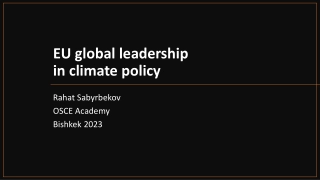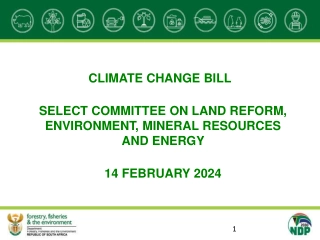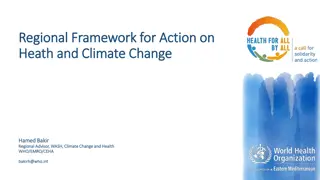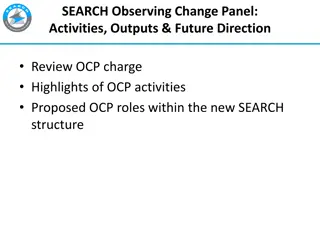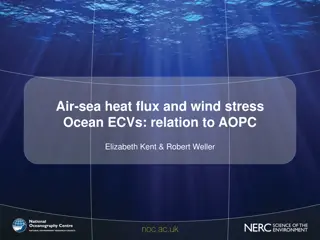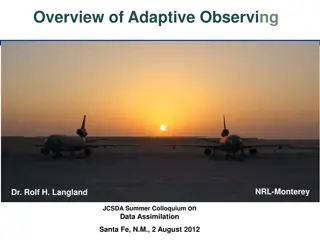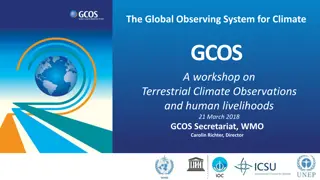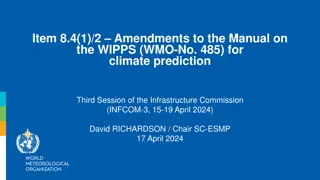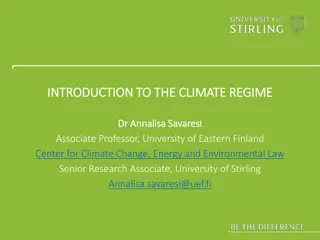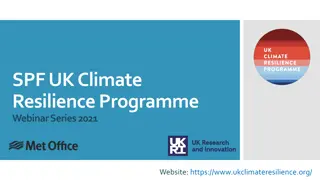Global Climate Observing System Governance Review
The Joint Study Group on the Global Climate Observing System (GCOS) conducted a review of the governance and structure of the GCOS programme, presenting 6 high-level recommendations for enhancing collaboration, stakeholder engagement, and addressing new challenges. The recommendations aim to strengthen the effectiveness and relevance of GCOS in monitoring climate variables and supporting climate adaptation and mitigation efforts worldwide.
Download Presentation

Please find below an Image/Link to download the presentation.
The content on the website is provided AS IS for your information and personal use only. It may not be sold, licensed, or shared on other websites without obtaining consent from the author.If you encounter any issues during the download, it is possible that the publisher has removed the file from their server.
You are allowed to download the files provided on this website for personal or commercial use, subject to the condition that they are used lawfully. All files are the property of their respective owners.
The content on the website is provided AS IS for your information and personal use only. It may not be sold, licensed, or shared on other websites without obtaining consent from the author.
E N D
Presentation Transcript
The 76th session of the Executive Council (EC-76, 27 February 3 March 2023) Item 3.2(23) Report of the Joint Study Group on the Global Climate Observing System (JSG-GCOS) Submitted by president of INFCOM 1
Joint Study Group on the Global Climate Observing System (GCOS) BACKGROUND GCOS programme started operating in 1992 With the WMO reform (2019) the GCOS governance and structure had to be reviewed A Joint Study Group (JSG) 15 members representing GCOS co-sponsors (WMO, IOC-UNESCO, ISC, UNEP) and stakeholders was established in 2020 to review GCOS governance and structure The JSG-GCOS Report was presented at the INFCOM-2 session (24-28 Oct 2022): Draft Recommendation 6.7(1)/1 (INFCOM-2) The JSG-GCOS proposed 6 High-Level Recommendations (HR)
JSG-GCOS 6 High-Level Recommendations HR1: the GCOS sponsors should consider revising the existing MoU, divided in two sections: i) the main MoU with high-level objectives; ii) annexes that address operational procedures and a more detailed governance structure. HR2: the GCOS Steering Committee should continue to enhance closer collaboration and integration between GCOS panels to take into account changes in the international landscape, new variables and areas of work, the WMO reform and other needs from sponsors and beneficiaries. HR3: GCOS should improve its engagement with stakeholders and partners, considering a mechanism for providing a formal recognition of those groups in its revised governance structure. (1/2)
JSG-GCOS 6 High-Level Recommendations HR4: GCOS should continue to address new challenges (e.g. those caused by changing climate on fresh water, food security and biodiversity), by evolving, revising and improving the utility of its Essential Climate Variables (ECVs) and their requirements, that should contribute to a better understanding of the energy, water and carbon cycles, support climate adaptation and mitigation, and address the biosphere, biodiversity and biogeochemistry. HR5: the MoU should clarify the role of GCOS as an independent group of experts to the UNFCCC process while meeting the needs and ambitions of its sponsors. HR6: the GCOS Steering Committee should establish a regular structured dialogue with the sponsors (programmatic and resource) on strategic, policy, funding and governance matters of GCOS. (2/2)
Recommendation 30 (INFCOM-2) - Report of the Joint Study Group on the Global Climate Observing System (GCOS) INFCOM-2 Decided: That the GCOS Chair be a member of the INFCOM Management Group (as described in Recommendation 11 of the JSG Report); That INFCOM will consider proposals made by the GCOS Steering Committee on the development of the global observing systems for climate relevant to WMO and its Members. Recommended: EC-76 adopts the draft Resolution 3.2(23)/1 EC-76. Invited: the co-sponsors of GCOS to consider supporting the recommendation of the Joint Study Group on GCOS.
Doc 3.2(23) REPORT OF THE JOINT STUDY GROUP ON THE GLOBAL CLIMATE OBSERVING SYSTEM (GCOS) Action expected: Review and adopt the proposed draft Resolution 3.2(23)/1 EC-76 The EXECUTIVE COUNCIL: Approves Recommendation 30 (INFCOM-2) - Report of the Joint Study Group on the Global Climate, Observing System (GCOS); Decides to continue and further strengthen institutional support to GCOS within the Organization as a co-sponsored programme as regulated by the 1998 Memorandum of Understanding with partners IOC, UNEP and ISC or any new memorandum agreed with the international partners; Invites the GCOS Chair, in consultation with the president of INFCOM, to inform on the progress, performance and requirements of the global observing systems for climate; Urges Members to consider supporting the GCOS programme either financially or with in-kind contributions. 1/2
Doc 3.2(23) REPORT OF THE JOINT STUDY GROUP ON THE GLOBAL CLIMATE OBSERVING SYSTEM (GCOS) Action expected: Review and adopt the proposed draft Resolution 3.2(23)/1 EC-76 The EXECUTIVE COUNCIL: Requests the Secretary-General (1)To prepare a revised GCOS Memorandum of Understanding (MoU) with the co- sponsors for approval by the Executive Council, based upon the draft MoU contained in the Joint Study Group Report, as recommended in High-level Recommendations 1 and 5 in the annex to this resolution; (2)To continue contributing to the Climate Observing System Fund (COSF) and encourage the other GCOS co-sponsors to make their commitments (financial or/and in-kind) in order to ensure the basic resources for the operation of the GCOS secretariat. 2/2
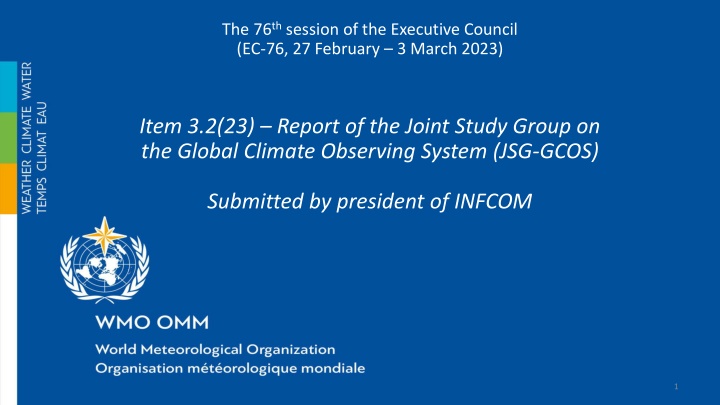

![[PDF⚡READ❤ONLINE] Solar Surveyors: Observing the Sun from Space (Springer Praxis](/thumb/21536/pdf-read-online-solar-surveyors-observing-the-sun-from-space-springer-praxis.jpg)

